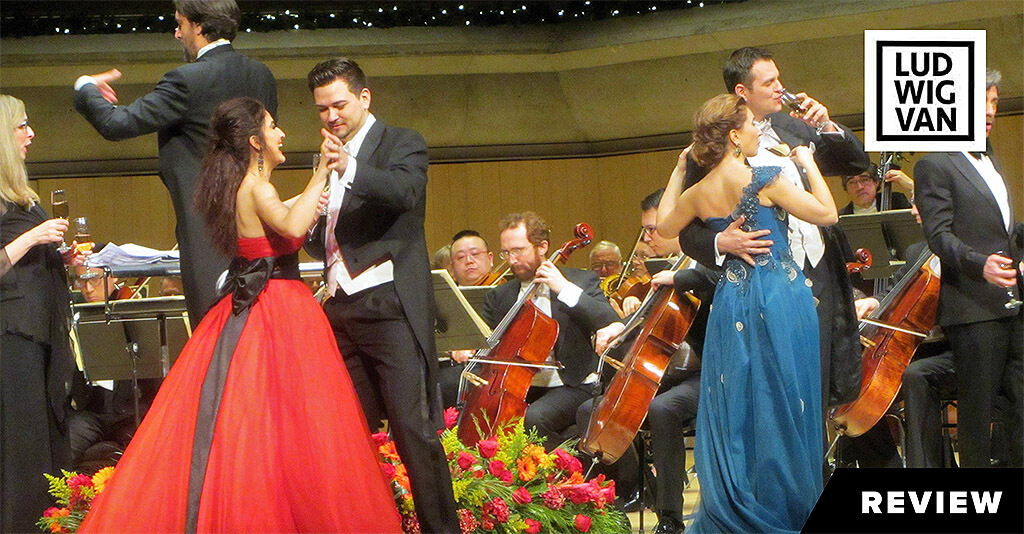
Bravissimo! Opera’s Greatest Hits | Arias, choral and orchestral selections from Tannhäuser, Romeo et Juliette, Rigoletto, Il trovatore, Le nozze di Figaro, Idomeneo, Die Zauberflöte, La traviata, Eugene Onegin, and Turandot. Ekaterina Kudryavtseva, sop.; Sera Gösch, sop.; Gergely Boncsér, ten.; Johannes Kammler, bar.; Michelangelo Mazza, cond. Opera Canada Symphony and Chorus. Rick Phillips, host. Dec. 31, 7 p.m. Roy Thomson Hall.
It’s that time of year again!
Since the founding of Attila Glatz Concert Productions three decades ago, Canadian-Hungarian impresario Attila Glatz and his wife Marion have been bringing a musical double-header to Toronto — the operatic gala concert Bravissimo on New Year’s Eve, and on New Year’s Day, Salute to Vienna, a mixed program of ballet, operetta and ballroom dancing. These shows give North American audiences a taste of Mitteleuropa’s musical tradition of saying goodbye to the old and ushering in the new. I was lucky enough many years ago to catch a New Year’s Concert in Munich and in Vienna — both unforgettable experiences.
The 2018 edition of Bravissimo is unusual in that there’s no homegrown talent on the roster — the quartet of soloists are all making their Canadian debuts: sopranos Ekaterina Kudryavtseva and Sera Gösch, tenor Gergely Boncsér, and baritone Johannes Kammler. Of the four, I was only familiar with Herr Kammler’s warm and ingratiating baritone, whom I’ve heard recently as Dominick in Arabella in Munich. And we’ll get to hear him again very soon, as Guglielmo in the COC Cosi fan tutte in February!
Having attended many Bravissimo concerts, I do detect a pattern – a typical program is made up of the tried and true from Italian and French operas, plus the occasional Russian or Slavic works, not to mention a sprinkling of Mozart or Handel. The concert typically ends with “Nessun dorma” by the tenor, who usually brings the house down. Then it’s encore time, invariably “Libiamo, libiamo,” followed by “Auld lang Syne.” Not a complaint, but to point out how comfortably predictable it is.
Therefore, it was a wonderful surprise to see Wagner on the program, Tannhäuser no less! It opened with Maestro Michelangelo Mazza leading the Opera Canada Symphony in Elisabeth’s “Dich teure Halle,” sung by Sera Gösch. A budding jugendlich dramatischer, she filled Roy Thomson Hall with exciting, attractive sound and the requisite big volume, a rather stentorian high B at the climax notwithstanding.
Then it was the 40-voice strong Opera Canada Chorus, with a large contingent of COC choristers, in a sonorous Entrance of the Guests. Johannes Kammler contributed a mellow Wolfram’s “O du, mein holder Abendstern,” this aria is surely Wagner’s gift to the lyric baritone. Indeed, it makes me wonder why Tannhäuser has never been staged by the Canadian Opera Company. C’mon, COC — it’s long overdue!
Russian soprano Ekaterina Kudryavteva brought bright tone and fine coloratura to Juliette’s Waltz, while Hungarian Gergely Boncsér showed off his beautiful lyric tenor in “La donna è mobile.” The first half concluded with a group of Mozart. Sera Gösch served up plenty of fire and brimstone in Elettra’s “D’Oreste, d’Ajace,” followed by Kammler as an ingratiating Birdcatcher in “Der Vogelfängler bin ich ja.” The big surprise was the two of them in the very fun Papageno-Papagena duet, complete with cartoonish costumes. It must have been one of those rare moments in performance history for a spinto soprano to go from Elettra to Papagena in a matter of minutes!
The second half was devoted mostly to La Traviata and Eugene Onegin. Kudryavtseva sang affectingly Violetta’s great scena in “E strano…Sempre libera,” including a huge E-flat at the end. Boncsér was every bit as good in Alfredo’s Act 2 aria, and the two of them joined forces for an enjoyable duet. Kammler, while not a true Verdi baritone, acquitted himself honourably in “Di Provenza il mar.” Sera Gösch was excellent in Tatiana’s Letter Scene — sadly only the second half was performed. The official program ended with the obligatory “Nessun dorma,” and when you have a tenor with as fine a voice as Boncsér, he naturally brought the house down.
By then, the audience was whooping it up, and they were rewarded with “Libiamo, libiamo.” The chorus came down from the choir loft to share in the merriment and the bubbly. Was that real champagne? The ultimate piece was “Auld lang syne” with the audience joining in. Through it all, Michelangelo Mazza proved to be a very fine conductor, singer-friendly but always serving the music. He held the pick-up orchestra together very well, given the tight rehearsal schedule.
One down, one to go. Host Rick Phillips announced that Salute to Vienna was nearly sold out. Get ready for another fun afternoon!



